高考英语分词常见的几种特殊用法
- 格式:doc
- 大小:51.50 KB
- 文档页数:7
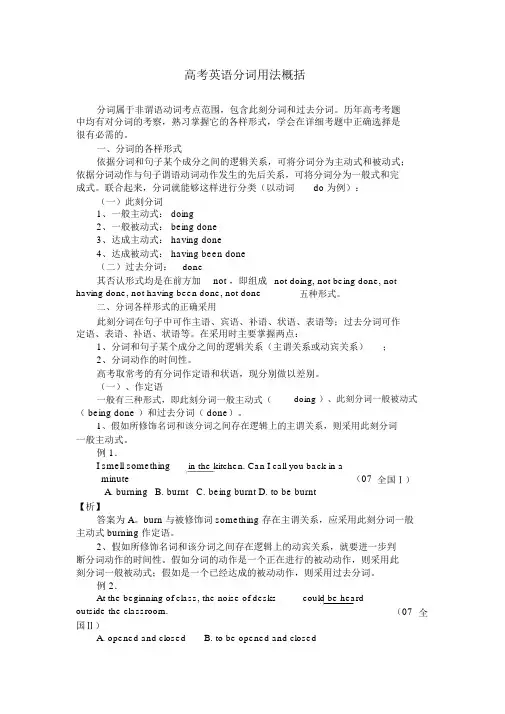
高考英语分词用法概括分词属于非谓语动词考点范围,包含此刻分词和过去分词。
历年高考考题中均有对分词的考察,熟习掌握它的各样形式,学会在详细考题中正确选择是很有必需的。
一、分词的各样形式依据分词和句子某个成分之间的逻辑关系,可将分词分为主动式和被动式;依据分词动作与句子谓语动词动作发生的先后关系,可将分词分为一般式和完成式。
联合起来,分词就能够这样进行分类(以动词do 为例):(一)此刻分词1、一般主动式: doing2、一般被动式: being done3、达成主动式: having done4、达成被动式: having been done(二)过去分词:done其否认形式均是在前方加not ,即组成not doing, not being done, not having done, not having been done, not done五种形式。
二、分词各样形式的正确采用此刻分词在句子中可作主语、宾语、补语、状语、表语等;过去分词可作定语、表语、补语、状语等。
在采用时主要掌握两点:1、分词和句子某个成分之间的逻辑关系(主谓关系或动宾关系);2、分词动作的时间性。
高考取常考的有分词作定语和状语,现分别做以差别。
(一)、作定语一般有三种形式,即此刻分词一般主动式(doing )、此刻分词一般被动式( being done )和过去分词( done)。
1、假如所修饰名词和该分词之间存在逻辑上的主谓关系,则采用此刻分词一般主动式。
例 1.I smell something in the kitchen. Can I call you back in aminute(07全国Ⅰ)A. burningB. burntC. being burntD. to be burnt【析】答案为 A。
burn 与被修饰词 something 存在主谓关系,应采用此刻分词一般主动式 burning 作定语。
2、假如所修饰名词和该分词之间存在逻辑上的动宾关系,就要进一步判断分词动作的时间性。
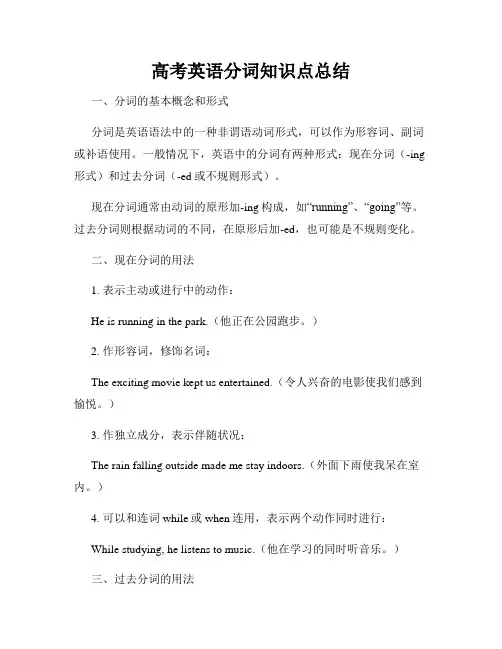
高考英语分词知识点总结一、分词的基本概念和形式分词是英语语法中的一种非谓语动词形式,可以作为形容词、副词或补语使用。
一般情况下,英语中的分词有两种形式:现在分词(-ing 形式)和过去分词(-ed或不规则形式)。
现在分词通常由动词的原形加-ing构成,如“running”、“going”等。
过去分词则根据动词的不同,在原形后加-ed,也可能是不规则变化。
二、现在分词的用法1. 表示主动或进行中的动作:He is running in the park.(他正在公园跑步。
)2. 作形容词,修饰名词:The exciting movie kept us entertained.(令人兴奋的电影使我们感到愉悦。
)3. 作独立成分,表示伴随状况:The rain falling outside made me stay indoors.(外面下雨使我呆在室内。
)4. 可以和连词while或when连用,表示两个动作同时进行:While studying, he listens to music.(他在学习的同时听音乐。
)三、过去分词的用法1. 作及物动词的宾语补足语:She has finished her homework.(她已经完成了她的作业。
)2. 作被动语态的动词:The book was written by a famous author.(这本书是一位著名作家写的。
)3. 作形容词,修饰名词:I was amazed by the breathtaking view.(那令人惊叹的景色使我惊讶。
)四、现在分词和过去分词的区别和用法1. 过去分词通常表示被动或完成的动作,而现在分词则表示主动或进行中的动作。
2. 现在分词可以修饰名词,与名词构成定语,而过去分词则常用作宾语补足语。
3. 现在分词常与连词while或when连用,表示与主句动作同时进行的动作;过去分词则常与连词after或before连用,表示在主句动作之前或之后完成的动作。


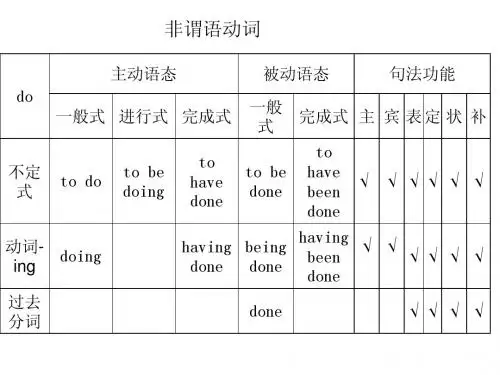
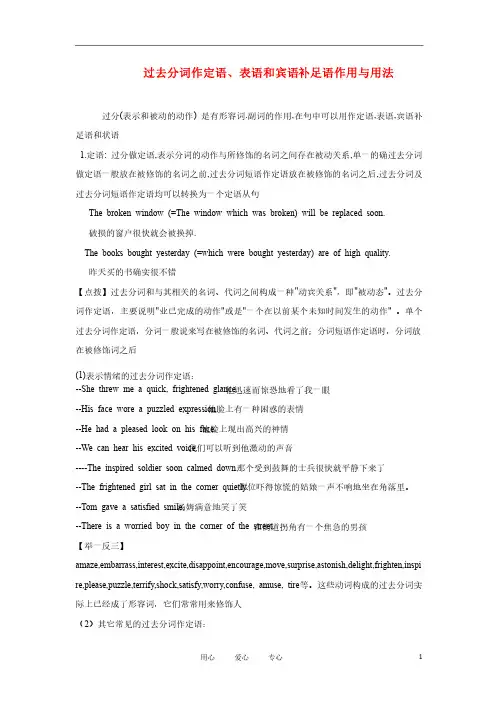
过去分词作定语、表语和宾语补足语作用与用法过分(表示和被动的动作) 是有形容词.副词的作用,在句中可以用作定语,表语,宾语补足语和状语足语和状语1.定语: 过分做定语,表示分词的动作与所修饰的名词之间存在被动关系,单一的确过去分词做定语一般放在被修饰的名词之前,过去分词短语作定语放在被修饰的名词之后,过去分词及过去分词短语作定语均可以转换为一个定语从句过去分词短语作定语均可以转换为一个定语从句The broken window (=The window which was broken) will be replaced soon. 破损的窗户很快就会被换掉. The books bought yesterday (=which were bought yesterday) are of high quality. 昨天买的书确实很不错昨天买的书确实很不错【点拨】过去分词和与其相关的名词、代词之间构成一种"动宾关系",即"被动态"。
过去分词作定语,主要说明"业已完成的动作"或是"一个在以前某个未知时间发生的动作" 。
单个过去分词作定语,分词一般说来写在被修饰的名词、代词之前;分词短语作定语时,分词放在被修饰词之后在被修饰词之后(1)表示情绪的过去分词作定语:表示情绪的过去分词作定语:--She threw me a quick, frightened glance.他迅速而惊恐地看了我一眼他迅速而惊恐地看了我一眼--His face wore a puzzled expression.他脸上有一种困惑的表情他脸上有一种困惑的表情--He had a pleased look on his face.他脸上现出高兴的神情他脸上现出高兴的神情--We can hear his excited voice.我们可以听到他激动的声音我们可以听到他激动的声音----The inspired soldier soon calmed down. 那个受到鼓舞的士兵很快就平静下来了那个受到鼓舞的士兵很快就平静下来了--The frightened girl sat in the corner quietly. 那位吓得惊慌的姑娘一声不响地坐在角落里。
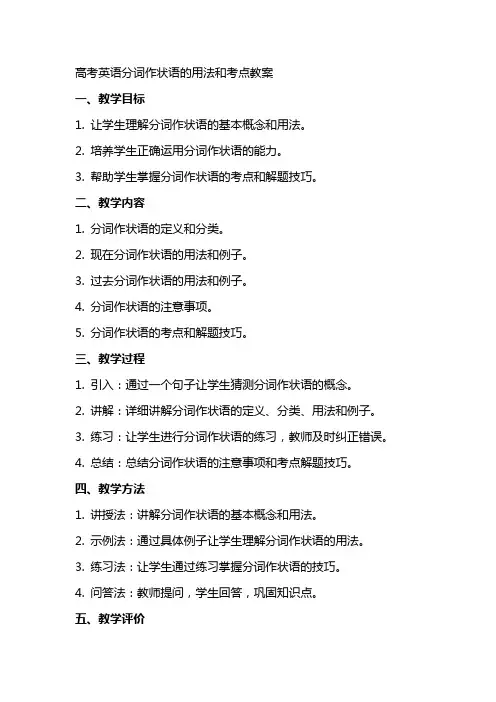
高考英语分词作状语的用法和考点教案一、教学目标1. 让学生理解分词作状语的基本概念和用法。
2. 培养学生正确运用分词作状语的能力。
3. 帮助学生掌握分词作状语的考点和解题技巧。
二、教学内容1. 分词作状语的定义和分类。
2. 现在分词作状语的用法和例子。
3. 过去分词作状语的用法和例子。
4. 分词作状语的注意事项。
5. 分词作状语的考点和解题技巧。
三、教学过程1. 引入:通过一个句子让学生猜测分词作状语的概念。
2. 讲解:详细讲解分词作状语的定义、分类、用法和例子。
3. 练习:让学生进行分词作状语的练习,教师及时纠正错误。
4. 总结:总结分词作状语的注意事项和考点解题技巧。
四、教学方法1. 讲授法:讲解分词作状语的基本概念和用法。
2. 示例法:通过具体例子让学生理解分词作状语的用法。
3. 练习法:让学生通过练习掌握分词作状语的技巧。
4. 问答法:教师提问,学生回答,巩固知识点。
五、教学评价1. 课堂练习:检查学生对分词作状语的掌握程度。
2. 课后作业:布置相关题目,要求学生独立完成。
3. 单元测试:进行阶段性的测试,评估学生的学习效果。
4. 课堂参与度:观察学生在课堂上的积极参与情况和提问回答情况。
六、教学重点与难点1. 教学重点:分词作状语的用法和分类。
分词作状语的注意事项。
分词作状语的考点和解题技巧。
2. 教学难点:正确区分现在分词和过去分词作状语的用法。
灵活运用分词作状语的能力。
理解和应用分词作状语的考点和解题技巧。
七、教学准备1. 教学材料:教材、PPT、练习题、答案解析。
2. 教学工具:投影仪、电脑、黑板。
3. 教学资源:相关英语学习网站、参考书籍。
八、教学步骤1. 导入新课:通过一个句子引入分词作状语的概念。
2. 讲解新知识:详细讲解分词作状语的定义、分类、用法和例子。
3. 练习与展示:学生进行分词作状语的练习,展示答案并讨论。
4. 总结与归纳:总结分词作状语的注意事项和考点解题技巧。
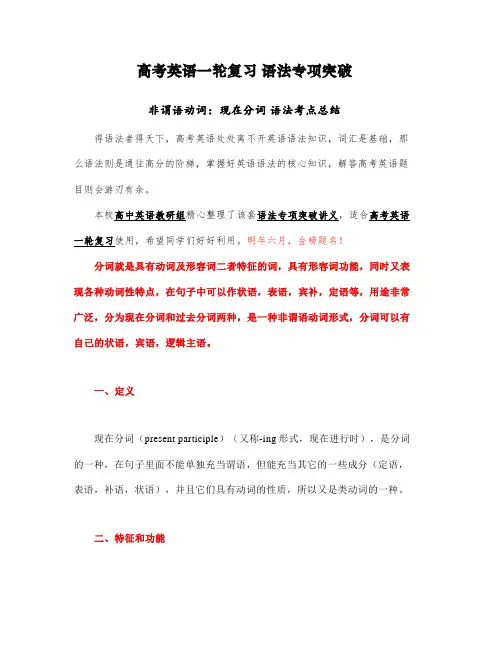
高考英语一轮复习语法专项突破非谓语动词:现在分词语法考点总结得语法者得天下,高考英语处处离不开英语语法知识,词汇是基础,那么语法则是通往高分的阶梯,掌握好英语语法的核心知识,解答高考英语题目则会游刃有余。
本校高中英语教研组精心整理了该套语法专项突破讲义,适合高考英语一轮复习使用,希望同学们好好利用。
明年六月,金榜题名!分词就是具有动词及形容词二者特征的词,具有形容词功能,同时又表现各种动词性特点,在句子中可以作状语,表语,宾补,定语等,用途非常广泛,分为现在分词和过去分词两种,是一种非谓语动词形式,分词可以有自己的状语,宾语,逻辑主语。
一、定义现在分词(present participle)(又称-ing形式,现在进行时),是分词的一种,在句子里面不能单独充当谓语,但能充当其它的一些成分(定语,表语,补语,状语),并且它们具有动词的性质,所以又是类动词的一种。
二、特征和功能一面具有动词的特征,可以有自己的宾语和状语;另一面具有形容词和副词的特征,可以充当表语,定语,状语,补足语,可以表示主动或正在进行的动作。
三、垂悬结构现在分词作状语时,其逻辑主语应该与句子的主语一致,但有时现在分词的主语与其所在句中的主语并不一致,这种现在分词即所谓的垂悬现在分词。
垂悬现在分词容易使句意模糊,甚至造成歧义,因而通常被认为是不合规范或错误的用法,例如:不论是走路或睡觉,我总是在想着这个问题。
Walking or sleeping,this subject was always in my mind.---->walking or sleeping 的逻辑主语是句中的my应改为:Walking or sleeping, I was always thinking of the subject.在爬山时,探险家们看见几头野猪。
Climbing up the hill, several boars were seen.应改为:Climbing up the hill, the explorers saw several boars.四、两个基本特点1、在时间上,表示动作正在进行。
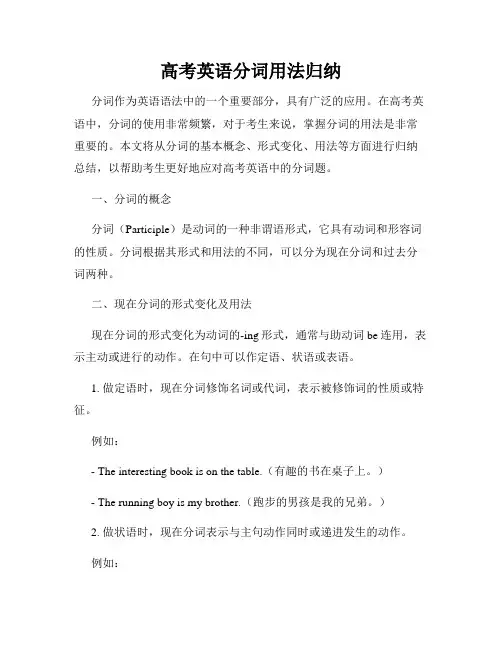
高考英语分词用法归纳分词作为英语语法中的一个重要部分,具有广泛的应用。
在高考英语中,分词的使用非常频繁,对于考生来说,掌握分词的用法是非常重要的。
本文将从分词的基本概念、形式变化、用法等方面进行归纳总结,以帮助考生更好地应对高考英语中的分词题。
一、分词的概念分词(Participle)是动词的一种非谓语形式,它具有动词和形容词的性质。
分词根据其形式和用法的不同,可以分为现在分词和过去分词两种。
二、现在分词的形式变化及用法现在分词的形式变化为动词的-ing形式,通常与助动词be连用,表示主动或进行的动作。
在句中可以作定语、状语或表语。
1. 做定语时,现在分词修饰名词或代词,表示被修饰词的性质或特征。
例如:- The interesting book is on the table.(有趣的书在桌子上。
)- The running boy is my brother.(跑步的男孩是我的兄弟。
)2. 做状语时,现在分词表示与主句动作同时或递进发生的动作。
例如:- He reads a book, humming a song.(他边看书边哼歌。
)- The students walked into the classroom, chatting and laughing.(学生们边走进教室边聊天笑。
)3. 做表语时,现在分词与系动词be连用,表示主语的状态或特征。
例如:- The little girl is sleeping.(小女孩正在睡觉。
)- The house is being renovated.(房子正在装修。
)三、过去分词的形式变化及用法过去分词的形式变化有规律变化和不规则变化两种,通常与助动词have、be等连用,表示被动、完成或状态。
在句中可以作定语、状语或表语。
1. 有规律变化的过去分词:动词原形+ed或d(尾音是e的直接加d)。
例如:- The broken window needs to be fixed.(那个破窗户需要修理。
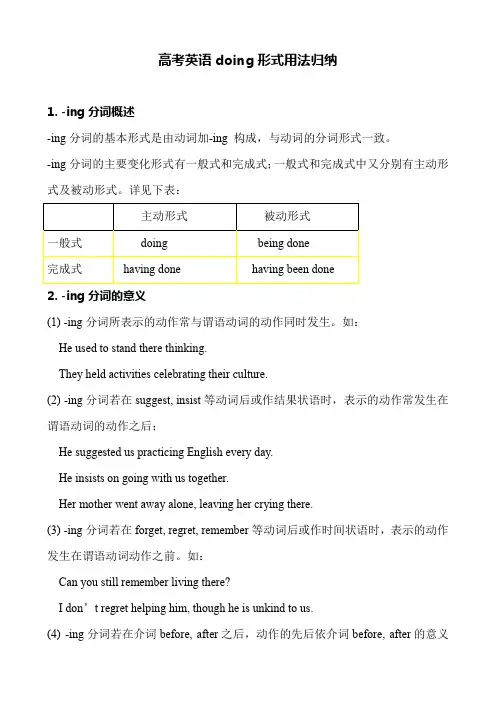
高考英语doing形式用法归纳1. -ing分词概述-ing分词的基本形式是由动词加-ing 构成,与动词的分词形式一致。
-ing分词的主要变化形式有一般式和完成式;一般式和完成式中又分别有主动形式及被动形式。
详见下表:(3) -ing分词若在forget, regret, remember等动词后或作时间状语时,表示的动作发生在谓语动词动作之前。
如:Can you still remember living there?I don’t regret helping him, though he is unkind to us.(4) -ing分词若在介词before, after之后,动作的先后依介词before, after的意义而定。
如:I often read some newspaper before getting to sleep.(5) -ing分词表泛指意义的动作或状态时,没有时间意义。
如:Keeping on doing morning exercises is a good habit.(6) -ing分词的完成式表示所发生的动作在谓语动词的动作之前。
如:Not having received her answer, he decided to write to her again.(7) -ing分词的主动形式,表明逻辑主语所发出的动作;-ing分词的被动形式表明逻辑主语是动作的承受者。
如:Seeing from the top of the mountain, you will find the town very beautiful.Seen from the top of the mountain, the town looks beautiful.(8) -ing分词的否定式是在-ing分词前面加否定词not。
如:Not knowing what to do, he went to ask the teacher for help.Not having made it clear, he went to ask the teacher about it again.3. -ing分词的句法功能-ing分词具有动词的一些特征,可带自己的宾语或状语,从而一起构成动词—ing 形式的短语。
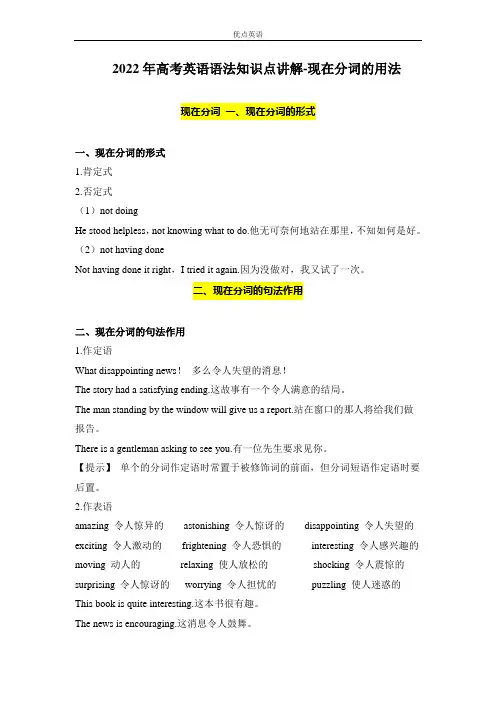
2022年高考英语语法知识点讲解-现在分词的用法现在分词一、现在分词的形式一、现在分词的形式1.肯定式2.否定式(1)not doingHe stood helpless,not knowing what to do.他无可奈何地站在那里,不知如何是好。
(2)not having doneNot having done it right,I tried it again.因为没做对,我又试了一次。
二、现在分词的句法作用二、现在分词的句法作用1.作定语What disappointing news!多么令人失望的消息!The story had a satisfying ending.这故事有一个令人满意的结局。
The man standing by the window will give us a report.站在窗口的那人将给我们做报告。
There is a gentleman asking to see you.有一位先生要求见你。
【提示】单个的分词作定语时常置于被修饰词的前面,但分词短语作定语时要后置。
2.作表语amazing 令人惊异的astonishing 令人惊讶的disappointing 令人失望的exciting 令人激动的frightening 令人恐惧的interesting 令人感兴趣的moving 动人的relaxing 使人放松的shocking 令人震惊的surprising 令人惊讶的worrying 令人担忧的puzzling 使人迷惑的This book is quite interesting.这本书很有趣。
The news is encouraging.这消息令人鼓舞。
3.作宾语补足语(1)作及物动词的宾语补足语用现在分词作宾补的动词:bring 引起catch 碰上(撞上)discover 发现feel 感觉find 发现get 使have 使hear 听见keep 使leave 听任listen to 听着look at 看着notice 注意到observe 观察see 看见send 使(突然做某事)set 引起(做某事)start 使(开始做某事)watch 观看His letter left me feeling pretty humble.他的信使我感到自己很卑微。
高考英语语法数词、形容词、副词的特殊用法一、数词数词的几个特殊使用之处:1、一般情况下数词为单数,但是在以下特殊情况中可以使用复述形式:1)hundred thousand million 之前没有数词或其它限定词,并且之后有“of +名词”的形式时。
Hundreds of soldiers2)在一些介词词组中的固定用法We arrived in twos and threes.3)表示人的年龄He is in his thirties2、表示数量的dozen n.一打, score n. 二十个可以视为基数词使用I want a dozen pencils, please.3、“数词+名词”或者“数词+名词+ed”(中间有连字符),可以组成一个复合形容词,其中的名词应该使用单数。
There is a four-legged table.A two-year-old girl例题:1. She went to the bookstore and bought ____. 2006北京A dozen booksB dozens booksC dozen of booksD dozen of books2. It took us quite a long time to get here. It was ____ journey. 2005北京A three hourB a three hourC a three-hourD three-hours二、形容词1.形容词做定语修饰顺序:限定词+主观描绘性形容词+表示大小、长短、形状、颜色、新旧的形容词+地点形容词+材料形容词或名词+被修饰词This ____girl is Linda’s cousin.(2005北京)A. pretty little SpanishB. Spanish little prettyC. Spanish pretty littleD. little pretty Spanish2.作宾语补足语John was so sleepy that he could hardly keep his eyes_____(1992)A. open b. to be opened C. to open . D. opening3.表示“激起情绪”和“感到情绪”的形容词表示“激起情绪”的形容词Interesting surprising exciting satisfying/unsatisfying boring tiring/tiresome pleasant comfortable fearful joyful doubtful表示“感到情绪”的形容词Interested surprised excited satisfied/unsatisfied bored tired pleased comfortable fearful jo yful doubtful1)Tom sounds very much____ in the job ,bur I’m not sure whether he can manage it.(2006安徽)A. interestedB. interestingC. interestinglyD. interestedly2)A good story does not necessarily have to have a happy ending, but the reader must not be left____.(2006天津)A. unsatisfiedB. unsatisfyingC. to be unsatisfyingD. being unsatisfied三、副词1.做状语There was such a long queue for coffee at the interval that we ____gave up.(2005上海)A. eventuallyB. unfortunatelyC. generouslyD. purposefully四、形容词副词比较等级的用法1.副词比较和最高级1)Some experts think that language learning is much ____for children as their tongues are more flexible.(2006上海春)A easy B. easier C. easily D. more easily2)Professor White has written some short stories ,but he is ____ known for his plays.(1998)A. the bestB. moreC. betterD. the most2.原级比较级的表达基本结构:as+形容词或副词原级(+名词)+as否定形式:not as/so+形容词或副词原级(+名词)+as1)The more I think about him, the more reasons I find for loving him ____I did.(2005湖南)A. as much asB. as long asC. as soon asD. as far as2)Our neighbor has ____ours .(2003北京)A. as a big house asB. as big a house asC. the same big house asD. a house the same big as3.比较级的表达基本结构:形容词或副词的比较级+than1)This washing machine is environmentally friendly because it uses ____water and electricity than ____models.(2006北京)A. less, olderB. less elderC. fewer, olderD. fewer, elder2)—Did you take enough money with you?—No, I needed ____I thought I would.(2006)A. not so much asB. as much asC. much more thanD. much less than4.最高级表达Greenland, ____island in the world, covers over two million square kilometers.(2000上海)A. it is the largestB. that is the largestC. is the largestD. the largest。
2021届高考英语考查热点-分词作状语及练习题(含答案)分词作状语是高考考查的热点和重要考点,其热点考查内容如下:一.确定分词形式分词作状语时,通常放在句首,并且用逗号与主句隔开。
同时,分词作状语时其逻辑主语与主句主语应保持一致,也就是说在确定选择现在分词还是过去分词时,要判断主句主语与分词中心词的关系。
如果句子的主语是动词-ing形式所表示的动作的发出者(即表主动或正在进行),分词形式选用现在分词;如果句子的主语是动词-ed形式所表示的动作的承受者时(即表被动或完成),分词形式选用过去分词。
例:1, _______, I stretched my hand out for it.A. I saw the book I wanted on the shellB. The book I wanted was on the shellC. Seeing the book lying across the deskD. Lying on the desk分析:分词作状语时,其逻辑主语应与句子的主语一致。
根据这一原则,可知句子的主语I只能与see保持一致。
如果选A, 该句中没有连词,没能构成并列句和主从复合句,此时要选用非谓语动词形式。
所以选C2, Seen from the hill, the park looks very beautiful.分析:“Seen from the hill” 是过去分词作状语。
分词作状语时,其逻辑主语应与句子的主语一致。
根据这一原则,可知,“the park”是“Seen from the hill”的逻辑主语,它们之间表示被动关系,所以分词形式用seen.二.确立句子主语可能是谁确立句子主语可能是谁时,仍然遵循分词作状语时其逻辑主语与主句主语应保持一致的原则。
反过来要根据分词形式确立句子主语。
例:Having been attacked by terrorists, _________.A. doctors came to their rescueB. the tall building collapsedC. an emergency measure was takenD. warning were given to tourists分析: 本题仍考查非谓语动词的用法。
高考英语重点语法解析(2)分词作状语分词作状语用法是所有分词用法中最重要的,也是最难掌握的。
历年的高考英语考题也说明,分词作状语的用法是所有分词用法中最常考的。
因此,本文拟对分词作状语的用法作一小结和分析,同时归纳一些行之有效的做题方法和理解技巧,以帮助同学们掌握其用法。
一、用作时间状语1. 典型例句Seeing the cat,the mouse ran off. 见到猫,老鼠就跑了。
The work finished,he went home. 工作做完后,他就回家了。
2. 理解技巧分词(短语)用作时间状语通常可转换成时间状语从句(引导时间状语的从属连词需根据句意来确定),如上面两句也可转换成:When [As soon as] the mouse saw the cat,it ran off.After the work was finished,he went home.3. 高考实例When _____different cultures,we often pay attention only to the differences without noticing the many similarities. (2006浙江卷)A. comparedB. being comparedC. comparingD. having compared【分析】此题答案选C,分词短语when comparing different cultures 相当于时间状语从句when we compare different cultures。
二、用作原因状语1. 典型例句Being very weak,she couldn’t move. 她由于身体虚弱而不能行动。
His car broken down,he had to walk. 他的车坏了,所以只好走路。
Much discouraged,she moved on to London. 她很沮丧,搬到了伦敦。
过去分词的用法一、过去分词作定语用法〔Past Participles Used as Attributes〕过去分词作定语,在语态上,表被动;在时间上,表示动作已经发生或完成,与它所修饰的名词有逻辑〔意义〕上的动宾关系。
过去分词作定语表示动作在谓语动作之前发生,已经完成并具有被动意义。
有时也不表示时间性。
作定语的过去分词一般由及物动词变来,因为只有及物动词才有被动意义。
He is a teacher loved by his students.也有用不及物动词的过去分词作定语的情况,一般作前置定语,它不表示被动意义,只表示主动意义,强调动作完成。
不能像及物动词的过去分词那样放在名词后面作定语。
例如:Fallen leaves retired workers the risen sun注意一下几点:1. 单个的过去分词作定语一般放在被修饰的名词之前。
例如:We needed much more qualified workers. My friend is a returned student. 单个分词也可以作后置定语,用以强调动作。
They decided to change the material used.2. 过去分词短语作定语要放在被修饰的名词后面,作后置定语,其作用相当于一个定语从句。
The student dressed in white is my daughter.=The student who is dressed in white is my daughter.)3. 如果被修饰的词是由every/some/any/no + thing/body/one所构成的复合代词或指示代词those等时,即使一个单一的分词做定语,也要放在被修饰词的后面。
Is there anything unsolved?There is noting changed here since I left this town.4. 单个过去分词前加一名词或副词,常用连字符将它们连接起来构成一个复合形容词,放在其修饰的名词前,作前置定语。
高考英语分词的用法分词作为英语语法中的一种非常重要的形式之一,经常出现在高考英语试卷中。
它具有多种用法和形式,包括现在分词、过去分词和分词短语。
下面将详细介绍高考英语中分词的用法和例句。
一、作主语分词可以作为句子的主语,强调行为的持续性和延续性。
常见的结构是“It/This/That is/was + 现在分词/过去分词”。
例句:1. Studying hard is important for students to achieve good grades.(现在分词作主语)2. Cooking dinner for the family was a daily routine for my mother.(过去分词作主语)二、作宾语分词作为句子的宾语,表明被动或完成的动作。
1. 情态动词+现在分词情态动词可以与现在分词结合,表示对过去或现在的怀疑、推测等。
例句:1. He must be studying in the library.(表示对他正在图书馆学习的推测)2. They could be waiting for the bus.(表示他们可能正在等公交车)2. 动词+不定式/现在分词有些动词后面可以接不定式或现在分词作宾语,但含义略有区别。
例句:1. I enjoy reading novels in my spare time.(不定式作宾语)2. She finished writing her report yesterday.(现在分词作宾语)三、作定语/状语分词可以作为定语修饰名词或作状语修饰动词、形容词等。
1. 现在分词作定语现在分词作为定语,修饰名词,表示主动或进行中的动作。
例句:1. The running water sounds refreshing.(现在分词修饰名词)2. The students standing in front won the first prize.(现在分词修饰名词)2. 过去分词作定语过去分词作为定语,表示被动、完成或说明状态。
1. 让学生理解分词作状语的概念和用法。
2. 培养学生识别和运用分词作状语的能力。
3. 帮助学生掌握分词作状语的考点和技巧。
二、教学内容1. 分词作状语的定义和分类。
2. 现在分词作状语的用法和例子。
3. 过去分词作状语的用法和例子。
4. 分词作状语的注意事项。
5. 分词作状语的考点和练习。
三、教学过程1. 引入:通过一个简单的句子引导学生思考分词作状语的概念。
2. 讲解:详细讲解分词作状语的定义、分类和用法。
3. 示例:给出现在分词和过去分词作状语的例子,让学生理解并模仿。
4. 练习:设计一些练习题,让学生运用所学知识进行练习。
5. 总结:对本节课的内容进行总结,强调重点和难点。
四、教学方法1. 讲授法:讲解分词作状语的概念、分类和用法。
2. 示例法:通过示例让学生理解和模仿分词作状语的用法。
3. 练习法:设计练习题,让学生巩固所学知识。
4. 互动法:鼓励学生提问和参与讨论,提高学生的积极性。
1. 课堂参与度:观察学生在课堂上的积极参与情况和提问次数。
2. 练习完成情况:检查学生完成练习题的正确率和进步程度。
3. 学习效果:通过课后作业和测试了解学生对分词作状语的掌握程度。
六、教学资源1. 教学PPT:制作包含分词作状语定义、分类、用法和例子的PPT。
2. 练习题:设计一些关于分词作状语的练习题,包括选择题、填空题和改错题。
3. 参考资料:提供一些参考资料,让学生课后进一步学习和巩固。
4. 教学视频:寻找一些关于分词作状语的教学视频,供学生课后自主学习。
七、教学步骤1. 引入新课:通过一个简单的句子引导学生思考分词作状语的概念。
2. 讲解分词作状语的定义、分类和用法。
3. 示例分析:给出分词作状语的例子,让学生理解并模仿。
4. 练习巩固:让学生完成练习题,巩固所学知识。
5. 课堂讨论:引导学生进行小组讨论,分享学习心得和疑问。
6. 总结回顾:对本节课的内容进行总结,强调重点和难点。
7. 课后作业:布置一些关于分词作状语的作业,让学生课后巩固。
高考英语分词常见的几种特殊用法一“悬垂分词”问题前节说过,分词(短语)有意义上的逻辑主语,它或是句子的主语,或者另有自己的主语,不然称这种分词为“悬垂分词”,这样的句子一般认为是不能接受或错误的。
【例如】※Looking out of the window of our hotel room, there are lots of mountains.(这句话听起来好象是那些山从窗户往外看。
)※Admired by everybody, dozens of letters reached the veteran soldier.(这句话听起来好象是信件被赞扬。
)※Sitting under an apple tree one night, an idea came to Newton.(这句话听上去好象是某种思想坐在树下。
)关于“悬垂分词”这条语法规则也有例外情况。
下面几种情况中的分词(短语),不再认为它们是“悬垂分词”,即句子是正确的。
1)有些分词(短语)可用来表示说话人的态度,看问题的角度,或者对所叙述的情况进行解释,它们便成了句子的独立成分,其逻辑主语也就不再是句子的主语。
【例如】Strictly speaking, nobody is allowed in here.严格地讲,谁也不允许在这儿。
(speaking的逻辑主语并不是nobody)Judging from his accent, he must be from the South.从他的口音判断,他一定是南方人。
(这句中不是he在“判断”)Taken as a whole, there is nothing with the book.总的来说,这本书没有问题。
Taking all thingssintosconsideration, his work is a successful one.全面考虑起来,他的工作还是很成功的。
经常这样用的分词(分词词组)有:frankly (broadly, generally, properly, strictly…) speaking, judging from(by)…,talking about…,speaking of…,looking at…,taking…into consideration, put frankly, taken…等。
2)这样使用的有些分词,在句子中逐渐起到连词或介词的作用,便把它们视为连词或介词。
【例如】Granting that he had the best intention, his conduct might work great mischief.就算他出于好意,他的行为也会引起极大不快。
There were ten people in the room, including me.屋子里有十个人,包括我在内。
Provided that my expenses are paid, I will go.要是我的费用有人代付,我就去。
经常这样使用的分词有:admitting (that), assuming (that), barring, concerning, presuming, granting, pending, excepting, failing, saving, supposing (that), touching, given, granted, provided(that)等。
3)某些句子中作状语的分词的逻辑主语虽然不是句子的主语,但可能是句中的另外某一成分,对这样的句子也不再认为是“悬垂分词”。
【例如】Seeing her health sinking rapidly, alarm clutched the father"s heart.她父亲看到她健康迅速恶化,很是惊慌。
(分词seeing的逻辑主语当然不是alarm,但它包含在宾语heart的定语father"s之中。
)His summer holidays were spent in the countryside, helping his father with farm work.他在乡下过暑假,帮助父亲干农活。
(分词helping的逻辑主语包含在主语holidays的定语his之中)以上句子之所以能被接受,是因为它们能清楚表达意思,不会引起误解,如第一句中alarm是抽象名词,不会误解为seeing的逻辑主语;第二句中主语holidays是无生命的名词,不可能误解为helping的逻辑主语。
4)如果句子谓语是被动语态,分词的逻辑主语可以包含在by后面的动作执行者之中(有时这个执行者并未明确表示出来)。
这样的句子也可以被接受,而非“悬垂分词”。
【例如】Ideas can be expressed accurately and effectively, using simple sentences.用简单的句子可以准确有力地表达思想。
Knowing as much as you do, the situation is easily explained.像你这样了解情况,很容易解释这一形势。
以上两句中的分词using和knowing的逻辑主语当然不是它们句子的主语ideas和situation,而是没有明确表达出来的express和explain 两个动作的执行者。
二解析分词的独立结构在分词作状语时,其逻辑主语一般应与句子的主语一致。
如果不一致的话,分词前面可以带有自己的逻辑主语(名词或代词),构成分词的独立结构(或称为带逻辑主语的分词结构)。
分词独立结构可表示伴随情况、陪衬动作、附加说明以及表示时间、原因、条件等。
【例如】The moon has no light of its own, only sunlight shining on it.(附加说明)She rushed out the room, the little baby carried in her arms.(伴随动作)Maggie ran back to the kitchen, eggs held carefully in her hand.(伴随动作)They being blind men, how could they see the elephants? ( =As they were blind men... )(表示原因)Circumstances changed, it is necessary for you to make a new plan.(表示原因)A force acting through a distance, work is done. (表示条件)Both bright side and dark side considered, you will have the confidence to overcome this difficulty. (表示条件)All flightsshavingsbeen cancelled because of the snowstorm, many passengers could do nothing but take the train.there be句型和it也能引出分词独立结构,作状语修饰主句,there和it相当于分词的逻辑主语。
【例如】There being nothing else to do, we went home.Thereshavingsbeen no rain, the plants withered. It being impossible for most students to turn in their papers as scheduled, the teacher decided to give them another two days. The sale usually takes place outside the house, with the audience ____on benches, chairs or boxes. (CET 4 2000,1)A)shavingsseated B) seating C) seated D)shavingsbeen seated本题考察的是with引导的分词的独立结构,seat一般用被动形式表示主动意思,所以用过去分词,答案为C。
seat可以用于如下句中:He came in and was seated in the chair. Please come in and be seated. So many directors____, the board meeting had to be put off. (CET 4 2000,6)A) were absent B) being absent C) been absent D) had been absent本题考察的是分词的独立结构,主语与分词之间是主谓关系,因此选择B。
三现在分词的完成被动式现在分词的完成被动式表示分词的动作发生在谓语的行为之前,且动作由逻辑主语所承受(即与逻辑主语是被动关系)。
【例如】Having been given such a good chance, he planned to work hard.Having been experimented several times, this new product will be putsintosmass production. All the compositionsshavingsbeen written and collected, the teacher dismissed the students.四现在分词被动式的用法在表示一个被动动作时,如果这个动作正在进行,或是与谓语表示的动作同时发生,我们可以用现在分词的被动形式。
【例如】The bridge being built now will be completed in three months.This is one of the experiments being carried on in our laboratory.Being surrounded by the students, the teacher was answering questions one by one.If I correct someone, I will do it with as much good humor and self-restraint as if I were the one ____. (CET-4 1996,6)A) to correct B) correcting C)shavingscorrected D) being corrected句意为:如果我批评某个人,我会尽量保持幽默,自我控制,像批评自己一样。